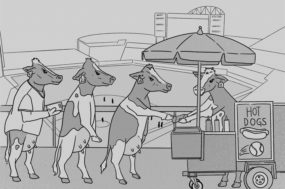In an instance of “déjà vu all over again,” the voters in California have elected Jerry Brown to serve as governor of the Golden State. Gov. Brown served two terms as California’s governor from 1975 to 1983 and presided over a period of tremendous labor turmoil in California agriculture. In his first term, he signed a landmark law that, for the first time, codified collective bargaining rights in agriculture.
On a national level, Congress created a system of legal regulation of labor relations in the 1930s that provided unions with the right to negotiate on behalf of workers and the ability to call for elections to establish their presence in a given workforce.
But agriculture has always been excluded from the coverage of federal labor relations law, and regulation of agricultural labor relations was left to the states. Currently, nine states (California, Arizona, Oregon, Maine, Massachusetts, Kansas, Hawaii, New Jersey and Wisconsin) provide for collective bargaining rights for farm workers.
As the mid-1970s approached, Cesar Chavez’s United Farm Workers (UFW) became a force to be reckoned with in California, and the period was marked by strikes, boycotts and even violence in the fields as the UFW fought for the right to bargain on behalf of farm workers.
As the UFW and the International Brotherhood of Teamsters fought for supremacy in the fields, violence between the two unions worsened, creating public concern and pressure on the state to act.
In his first term, Gov. Brown led the charge for labor law reform, and on June 4, 1975, he signed the Agricultural Labor Relations Act (ALRA), a landmark labor statute that provided for secret ballot elections, a mandatory collective bargaining process and unfair labor practice prosecution for employers and unions who did not comply with the law.
One of the unique features of the ALRA was that the only way for a union to become the certified representative of a farm’s workers was to win a secret ballot election.
Cesar Chavez insisted on this rule because he feared that farmers would voluntarily negotiate contracts with the Teamsters in order to thwart the UFW. The law was hailed as a victory for Cesar Chavez and the UFW, and labor disputes in California transformed from battles in the fields and streets to battles in ballot boxes and in courtrooms.
In what was undoubtedly intended to send a message, the California Senate took the opportunity on California’s Cesar Chavez holiday to approve “card check” legislation or Senate Bill 104. While the legislation’s supporters claim that all the bill does is provide an “alternative” to secret ballot elections, the bill will, for practical purposes, eliminate secret ballot elections on unionization in California agriculture.
The bill passed by a 24-14 party-line vote split in favor of the Democratic leadership. Under this bill, a union will be certified as the bargaining representative of farm workers if a majority of employees sign authorization cards supporting the union.
The bill, sponsored by the United Farm Workers union, also includes steeper monetary penalties for employers who commit unfair labor practices during organizing campaigns.
In recent years, agricultural unions have lost far more elections than they have won, especially in the dairy industry. Unions have been frustrated by losing elections despite the fact that the union will typically have at least 75 to 85 percent of the workers sign authorization cards before the election.
Unions claim this is because employers intimidate workers into voting against the union. Employers respond that once workers are free from union intimidation and co-worker peer pressure, and once they have had an opportunity to hear both sides of the issue, they vote their true desires at the ballot box.
Dozens of United Farm Workers members gathered in the hall outside the Senate floor, cheering after the vote and chanting – “Sí, se puede” (Yes, it can be done). Ironically, labor relations law has long recognized that the secret ballot election is a far better indicator of employee desires than authorization cards, and Cesar Chavez himself felt that secret ballot elections were the only way to decide on unionization.
Yet, as farm worker unions have increasingly failed to connect with workers, the unions have decided to try to tilt the playing field in their favor.
The vote marked the fifth time the state Senate has approved card check legislation. Four prior versions of the bill were vetoed by former Gov.Schwarzenegger, with each subsequent bill softening the change in hopes of obtaining the governor’s signature.
The current bill, SB 104, closely resembles the first version submitted to Gov. Schwarzenegger, which was the version most favorable to unions. While the California Assembly still needs to vote on the bill, the Assembly has approved each prior version of the bill, and observers universally expect the bill to reach the governor’s desk.
Union supporters hope Gov. Brown will sign the bill, but the governor has not yet taken a public position.
Gov. Brown has long been an ally of the United Farm Workers and other unions, and unions have been strong supporters of his political career. Based on this history, it seems unlikely that he will veto the bill.
Nonetheless, advocates for agriculture, including Western United Dairymen, are working tirelessly to convince the governor to oppose the bill. Farmers and their advocates should contact the governor to voice their opposition and hope that he will veto the bill.
If this bill passes, it will change labor relations as we know it. For the first time, an employer could find itself unionized before it even has a chance to tell employees the other side of the story, and employees can unionize without the best determiner of their true wishes – the secret ballot election.
This is a grave concern because it is very easy for a union to obtain authorization cards. In addition to cases of peer pressure and intimidation, there have even been situations where union organizers have simply lied to the workers about what they are signing in order to obtain the cards.
Even in the most innocent circumstances, union organizers can make “pie in the sky” promises about wages and benefits, obtaining signatures before employees have heard both sides of the debate. We have learned in the dairy industry that once the workers are fully informed, they will usually vote against the union.
But when the only hear from the union, they will sign authorization cards. If cards are all that are needed, dairies and other farmers may find themselves forced to the bargaining table regardless of their employees’ true desires. PD
The goal of this article is to provide employers with current labor and employment law information. The contents should not be interpreted or construed as legal advice or opinion. For individual responses to questions or concerns regarding any given situation, the reader should consult with Anthony Raimondo at McCormick Barstow LLP in Fresno, at ( 559) 433-1300 .

-
Anthony Raimondo
- Attorney
- McCormick, Barstow, Sheppard, Wayte & Carruth
- Email Anthony Raimondo

Why is card check legislation something dairymen should pay attention to immediately?
SB 104 would strip California farm workers of their fundamental and precious democratic right in deciding whether they want union representation – their right to a secret-ballot election. It would replace private ballots with an unprotected process, called “majority sign-up” that, in reality, is not an election at all.
California dairy producers need to speak up and let their state legislators and Gov. Brown know that this process not only undermines the right of employees to cast their ballots in a secure, private election booth free from coercion, or the fear of coercion, but it also deprives them of the chance to hear and consider other viewpoints on unionization.
Gary Conover
Director of Government Relations
Western United Dairymen
Both the California Senate and Assembly are heavily Democratic and the agricultural industry is powerless to stop the movement of these bills through the legislative process. The votes are all straight party-line. The real battle begins after the bills pass through to the Governor.
A “card check” election process that replaces the secret ballot boils down to this: A worker’s “vote” will, in every case, be cast in the presence of union “organizers.” Every dairyman should shudder at the thought of facing that kind of “election.”
And then consider the results of the easy spread of unions and how much power that would put into the hands of a few union leaders. Card check cannot be allowed, period.
William C. Van Dam
CEO, Alliance of Western
Milk Producers





